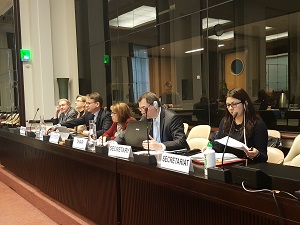
Six months after UNECE ministers from 44 countries renewed their commitments on a number of environmental issues in the region (Batumi, Georgia, 8-10 June 2016), delegates at the 22nd session of the UNECE Committee on Environmental Policy (CEP) discussed progress in the implementation of those commitments.
Highlighting good practices in the implementation of the two Batumi Initiatives — the Batumi Action for Cleaner Air (BACA) and the Batumi Initiative on Green Economy (BIG-E) — many countries shared their experiences, including at a dedicated side event organized jointly by Switzerland, UNECE, UNEP and the Green Growth Knowledge Platform. BACA and BIG-E also assist countries in achieving the relevant Sustainable Development Goal (SDG) targets. While about 30 countries and 13 organizations have already submitted voluntary actions, the initiatives remain open for additional commitments and stakeholders to join.
During the CEP session, held in Geneva from 25 to 27 January 2017, delegates also discussed the implementation of the SDGs. Belarus, Czechia and Kazakhstan shared their experience and practical ways for delivering on the 2030 Agenda for Sustainable Development and the SDGs. Following the positive response from delegates, the Committee decided to continue discussing its role in advancing the 2030 Agenda at future meetings.
To monitor progress towards the SDGs reliable data is needed. Ministers in Batumi therefore established a target of 2021 for making the Shared Environmental Information System (SEIS) fully functional across the pan-European region. To enable that target to be reached, CEP adopted a renewed mandate for the Working Group on Environmental Monitoring and Assessment, responsible, among others, for assisting in the establishment of national systems in line with SEIS and capacity-building with regard to specific challenges in environmental monitoring and assessment in the region.
CEP also adopted the recommendations of the third environmental performance reviews (EPRs) of Bulgaria and Tajikistan. It took note of ongoing reviews in Albania and Bosnia and Herzegovina, preparations by Kazakhstan for its third EPR, a request from Romania for a new EPR and an expression of interest by Ukraine to undergo a review. Mongolia also requested UNECE to carry out its EPR — the second time UNECE has received an invitation from a country outside the region to do so — which will be organized in close cooperation with ESCAP. To support the achievement of SDGs and to monitor progress in doing so, future EPRs will integrate relevant SDGs in the assessment process. The role of EPRs as a peer learning mechanisms was confirmed during an innovative peer learning discussion on countries’ cooperation with the international community.